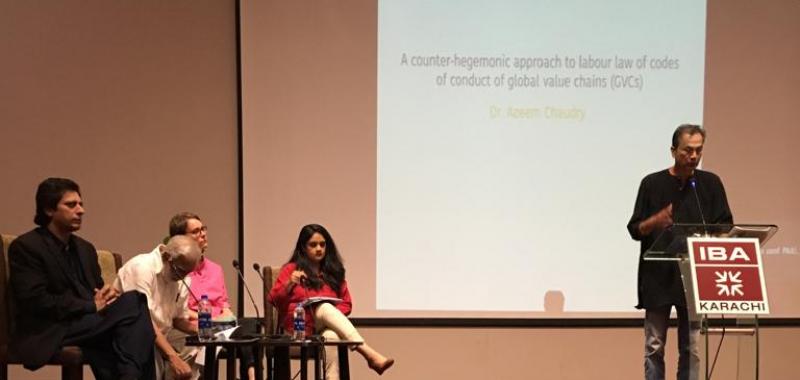
The Rasheed Razvi Centre for Constitutional and Human Rights held its first international conference titled, "Law, Judicial Interventions and Social Change, with a Special Focus on Labour Law" at IBA, Karachi on September 21-22, 2019. The conference was attended by judges, labour activists, academics, law practitioners, human rights activists and trade unionists.
Professor Muhammad Azeem Assistant Professor, Shaikh Ahmed Hassan School of Law (SAHSOL) presented his draft paper, "A Counter-hegemonic Approach to International Labour Law of Codes of Conduct of Global Value Chains." In his presentation, he posited that the concern for labour is distribution and representation, which is why labour law departed from private law (common law and civil law) to a 'radical democratic' or 'public constitutional' form of distributional concerns.
The recent turn to 'rights-based' approach, taking the shape of codes and Corporate Social Responsibility (CSR) in Global Value Chains, is also part of the same evolution. His paper explores the potential for distribution and representation in these CSR codes to conclude that in the Third World, distribution and representation concerns are best addressed by a 'radical democratic' approach to labour law.
Hiba Akbar, Teaching Fellow at SAHSOL, presented "Labour Law and Resistance under Chinese Investment in Pakistan: A Research Agenda for a Postcolonial Labour Law," a joint draft paper by Professor Azeem and herself. In her presentation, Ms. Akbar drew on extensive research on CPEC work sites in Pakistan to point out workers' ability to collectively bargain as the chief factors that governs their security and work relations. She noted that work sites where there was a strong presence of unions had significantly better work conditions than workers on projects where there were no unions.
Further, the worst work conditions existed on sites where the workforce consisted of highly precarious migrant workers. She concluded that Pakistan's constitutional and labour laws have taken on a private law approach to labour relations which assumes that all parties are situated equally. To ensure labour welfare, a return to true tripartite and democratic spirit of labour laws and constitutional laws is required.








